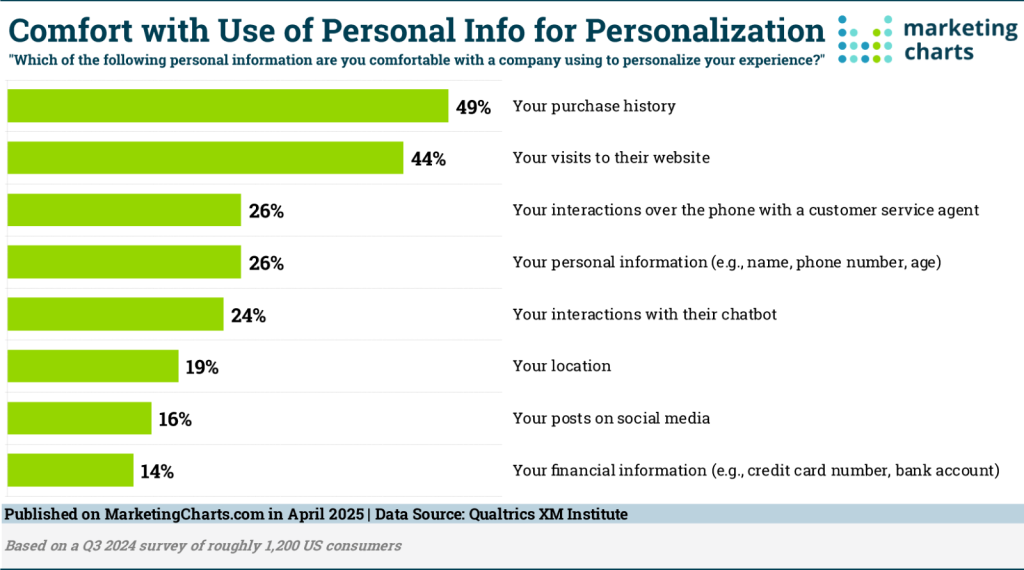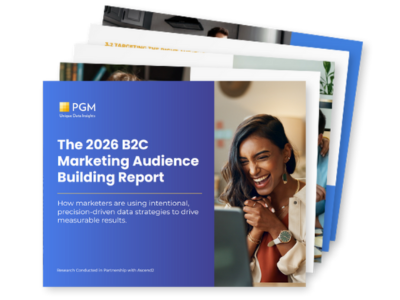Personalization has become the norm of modern marketing, and for good reason. Today’s consumers expect personalized experiences that make their lives easier, more relevant, and more connected. But they also expect brands to respect their privacy. As expectations rise, so does scrutiny.
Data privacy has always been top of mind for consumers. According to research from Qualtrics XM Institute, 49% of consumers are comfortable with the use of their purchase history. This was followed by 44% (visits to a band’s website), 26% (interactions over a phone with a customer support service agent), and 26% (personal information such as name, phone number, and age).
Clearly, marketers will need to learn how to balance the need for personalization and the importance of consumer privacy.

1. Consumers Crave Personalization, But It Has to Be Smart
64% of consumers prefer to buy from brands that personalize experiences.
What this means for your marketing :
Personalization isn’t a “nice-to-have”, it’s truly a necessity in today’s environment where every brand is vying for consumer attention. Consumers are complex and have different interests, needs, and preferences. Personalization is only effective when you have accurate, up-to-date consumer insights,
So, why is personalization so important? People want to be seen, and it’s no different when it comes to marketing. Think about your own experiences about being advertised too. When a company uses your name in an email, it makes it feel more personal. Or let’s say you are browsing a laptop on a browser. If a message or an advertisement is timely, it makes you more inclined to purchase.
Tip: So, how do you achieve this? An effective personalization strategy to ensure your message is timely and relevant is by tapping into behavioral data, like purchase history or browsing activity. For example, say you lead email marketing for a cosmetics retailer. You have a segment of customers who repeatedly purchase a certain brand of foundation. When running a sale on this brand of foundation products, leveraging purchase history data ensures you reach customers who frequently purchase this brand with your email campaign. And your messaging is timely, and relevant – and personalized!
2. Privacy is Still Top-of-Mind
Even though consumers expect personalization, they don’t want to feel like they’re being watched. Over half (53%) of global consumers are extremely or very concerned about data privacy, and only 33% of consumers trust a company to use their information responsibly.
What this means for your marketing:
Being transparent about why you’re collecting data is mandatory. Consumers want to know what you’re collecting, why you’re collecting it, and how it will benefit them – so be clear and most importantly, provide value through respecting their preferences.
Tip: Use simple language to explain data use. Offer clear opt-ins and opt-outs. Be sure to always give users control over their preferences. For example, say you offer a monthly subscription for a royalty-free music platform. Make sure you are transparent about them being able to cancel their subscription at any time, as well as make the process simple enough so they won’t get frustrated.
3. Trust is the Gateway to Deeper Personalization
There is a direct correlation between trust and willingness to share more sensitive data. When consumers trust a company, they are on average, 8% more likely to be comfortable with companies using each personal data type to personalize their experience.
What this means for marketers:
Trust is the key to creating deeper personalization for your consumers. The more trusted you are, the more effective personalization can be.
Tip: Personalize in stages. Start with simple personalization. Purchase history is the highest percentage type of personal information that consumers are comfortable with. Start with marketing toward their interests that they have already shown through their purchases. The more the consumer responds to the type of marketing that you are doing, the more you can move down the market.
Trust is important and not easily gained, but easily lost. If you or a company oversteps a consumer’s privacy, you’ll have lost them. Showing your consumers that they can trust you is the way for deeper personalization, which will only improve your marketing data.
4. 5 Tips to Deliver Personalized Experiences Without Compromising Trust
1. Progressive Profiling
Progressive profiling is the method of collecting a consumer’s data incrementally over a period of time rather than asking for it all at once. This is a great way to collect data without overwhelming the consumer. This method of collecting data helps build strong insights over time about a customer, which will only continue to evolve.
An example of what you can do is ask for data when it is relevant. Such as, prompting a customer to share their birthday in exchange for special offers and exclusive deals, like discounts on their birthday, or birthday “freebies”. This is a relevant and impactful way to personalize marketing, as well as building trust with a customer.
2. Behavioral Segmentation
Behavioral segmentation is the method of dividing customers into groups based on their behaviors, such as purchase habits, usage of products, and the things that they are engaged with.
What you can do is examine their past purchases, the types of websites they visit, and how they respond to your marketing efforts. Let’s say a consumer added a product to a cart, but didn’t purchase anything. You could send them a reminder about their cart, of advertise the product that they were already looking at.
3. Geographic personalization
Geographic personalization is the method of marketing toward a consumer based on their geography; such as location, weather, region, and so on.
Let’s say you have a snow gloves product. You wouldn’t market these gloves to someone in Florida. Knowing geographic personalization is important because it saves you money by marketing to someone who would be more inclined to purchase, such as someone who lives in Illinois as opposed to Florida.
4. Consent-forward messaging
Consent-forward messaging refers to only contacting consumers who gave their consent to be contacted. This transparency is important because it helps consumers trust you by either letting you contact them or clearly stating that they don’t wish for you to contact them.
A good method that you can do is to give clear opt-ins and opt-outs for messages. Such as for text messages, “Type Yes” or “Type No”. It’s important for a consumer to be in control over what they want to receive or what they don’t want to receive.
5. Value Exchange
Value exchange is a method that encourages value sharing, where both parties receive something. In this case, you would be receiving information to allow for further personalization for a consumer, and the consumer would be receiving things like a discount or a free item.
As mentioned before, you could offer discounts to the consumer or a free item for the exchange of information, such as birthdays, products that they are interested in, and so on.
Conclusion
Personalization is powerful, but it only works when it’s paired with transparency, ethics, and respect. Focusing on trust and, taking a user-first approach to personalization, you can meet consumer expectations without crossing the line.
Start with data you already have and build from there. Keep it simple, stay clear, and always put the customer’s experience first.





